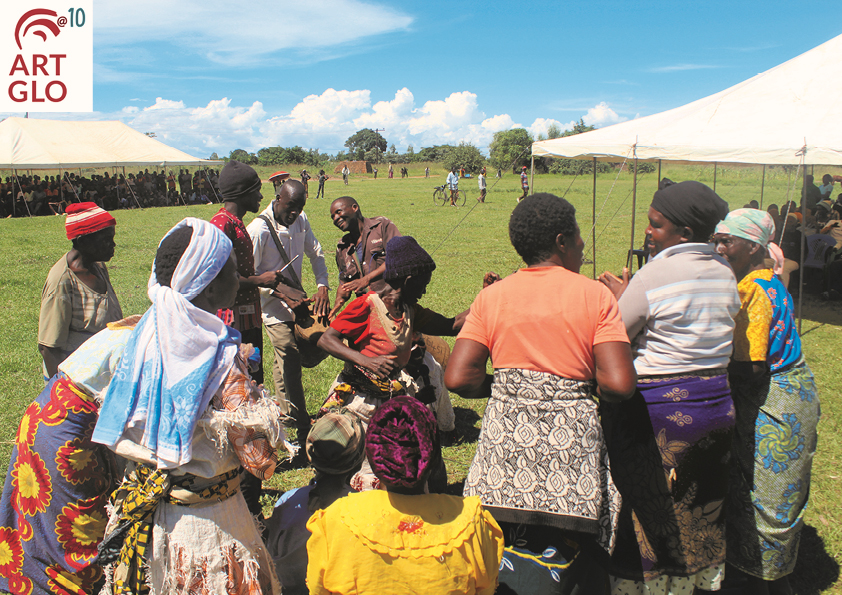Loss and damage induced by climate change have become one of the complex global challenges that has tremendously affected the livelihoods of people in developing countries including Malawi. Although these countries have not made significant contributions to such incidents, ArtGlo found out that some communities in Zomba are shifting the blame on each other for the persistent floods that affected them. This was uncovered during the first phase of the Amplifying Loss and Damage Community Voice through Art in Climate Action Project which inspired Trocaire to facilitate a relationship between Art & Global Health Center Africa (ArtGlo) and the Catholic Development Commission of Malawi (CADECOM) to jointly organize a Cultural festival for people within Group Village Heads (GVHs) Mbalu and Makawa under TA Mwambo in the district during the second phase.
People from the two GVHs share Likangala River which for the past decade has caused havoc due to tropical cyclones and heavy rains. During the first phase of the project in early 2023, we discovered that people from the two GVHs expressed resentment by each others vulnerability to natural calamities. This was unearthed through our separate and joint interactions with survivors of loss and damage induced by climate change, community leaders, and members. People from GVH Makawa cited that they are highly susceptible to floods because of human activity in the upper part of the river while their colleagues from Mbalu denied the claim. To bring about unity and collective effort among the people from the two communities, a cultural festival was organized and held at Matambala ground on the 16th of March 2024. Participants expressed deep appreciation and the benefit that the festival has brought into their lives.
“I have always been fascinated by cultural festivals like other tribes do in Malawi and I was excited when I heard for the first time that the Nyanja people will be hosting a similar event. I have learned about how to prepare traditional foods, our customs, and how initiation ceremonies used to be conducted in the past.” Said Edina Makasu from GVH Makawa.
Makasu further stressed that such events are crucial for people in Malawi and pities those who deliberately choose not to attend for they have missed beneficial lessons for better livelihoods, household management, and cooperation. She also pleaded with community leaders to fully support and actively participate in cultural heritage preservation initiatives and that self-interests should not drive them but prioritize the needs of their subjects. She emphasized that self-interest erodes cultural heritage.
Meanwhile, the Chairperson of the Village Disaster Risk Management Committee (VDRMC), James Linyenga, affirmed that what was displayed at the event is indeed their culture and that everyone in the area has a duty to safeguard the same. He also discouraged those who view traditional activities as primitive and retrogressive for development citing that it is wrong because it is undeniable that culture contributes to a person or group’s identity as well as fosters unity.
“I saw it as a great opportunity for me to be part of a team that planned and implemented this activity at the community level. I also assisted in the mobilization of local and traditional resources for use at the event,” said Mr. Linyenga.
Mr. Linyenga pleaded with his colleagues to desist from deliberately neglecting and not fully participating in development initiatives that are beneficial to the whole community. As a leader, he pledges to champion the preservation of culture by making use of community gatherings and school meetings. He will make use of the space provided by the Headmaster of Mitole Primary School in the area to engage students on issues about culture and later scale up to other schools using the approach that VDRMC utilizes in addressing issues of climate change together with children.
In preparation for the festival, ArtGlo and CADECOM engaged local leaders, representatives of village committees, and cultural custodians from the two GVHs to understand the culture of the Anyanja people, to identify what can be showcased and how best to hold a successful event. Traditional songs, dances, tales, herbs, initiation ceremonies, and cuisine were showcased and some of the participants tasted local foods which were prepared by some of the communities. The performances also tackled issues of psychosocial support to survivors of the devastating cyclones, gender-based violence, climate-smart agriculture, and tree planting as well as management initiatives.
The festival was also spiced up with a stand-up comedy performance by one of Malawi’s celebrated comedians, Ching’aning’ani and his colleague, Nganga Ajabilu. The duo placed a focus on tree planting and management to minimize the impact of floods. All these were made possible with support from the Scottish Catholic International Aid Fund (SCIAF) through Trocaire.



